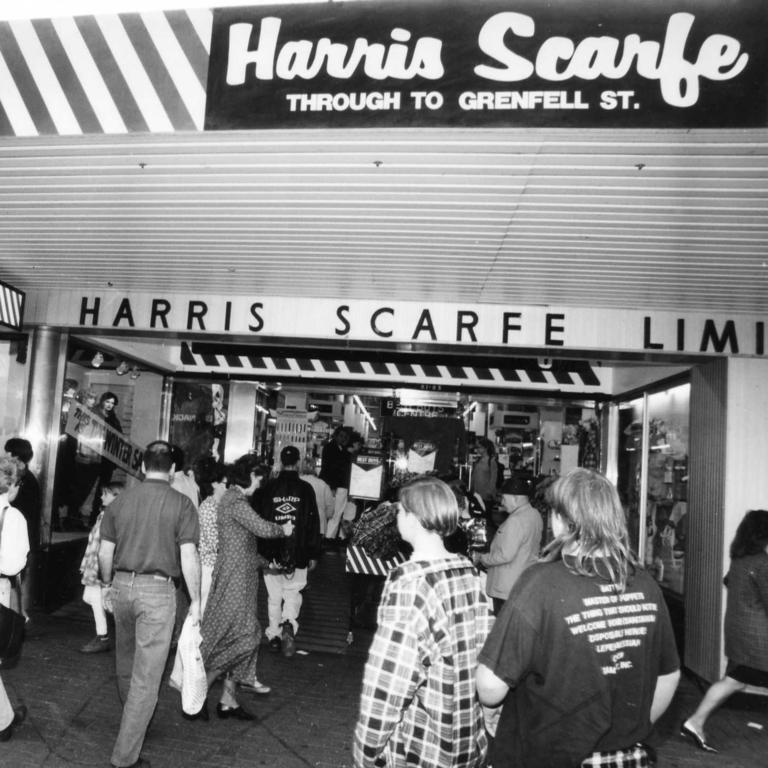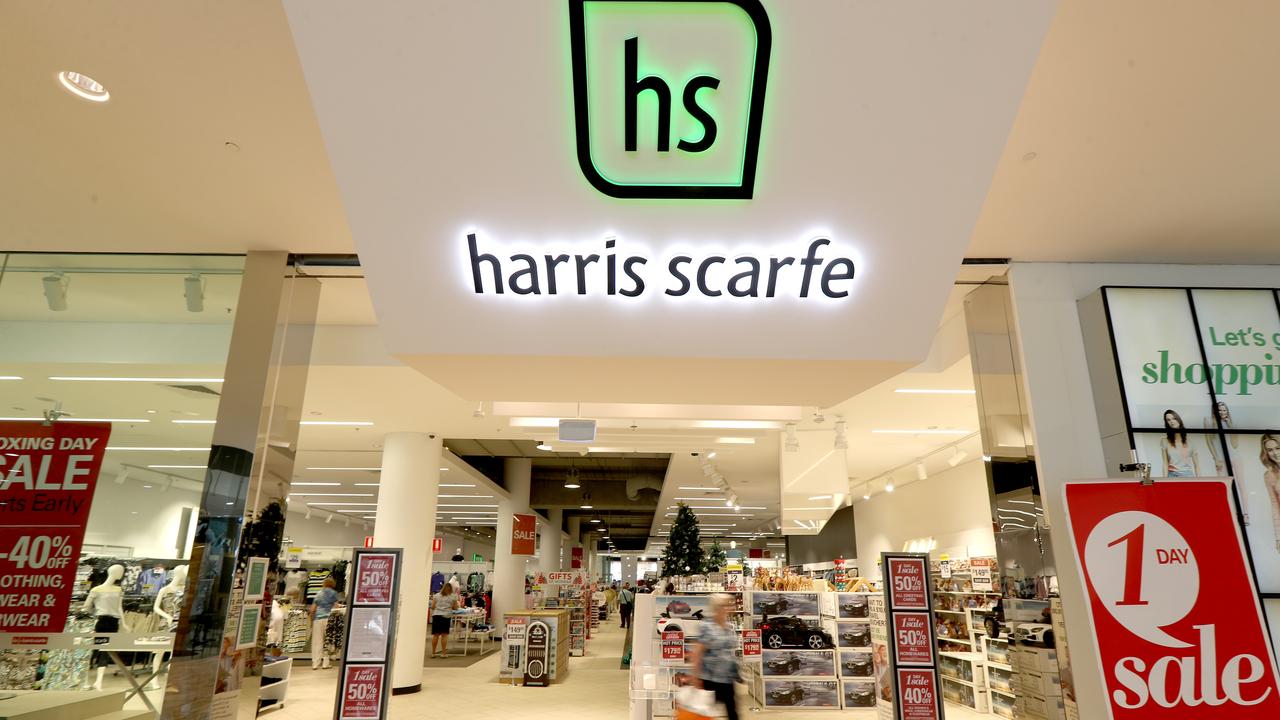South Australia’s oldest retailer has survived many dark days, but experts say the end is now
More than 1800 workers will spend Christmas not knowing how they’ll feed their families in 2020. But experts say their employer was always doomed.

This isn’t the first time Harris Scarfe has been on the brink of ruin.
The 170-year-old department store institution, founded in central Adelaide, was rescued from bankruptcy in 2001 and has changed hands four times since.
But retail experts say the recent plunge back into receivership will be the final chapter for the $380 million national chain, leaving more than 1800 staff from 66 stores unemployed.
Sector consultant at Retail Doctor Group, Brian Walker, said the company’s best chance of survival is to be “dismembered” and although there are potential buyers he says the continuation of South Australia’s oldest retailer is “more unlikely than likely”.
RELATED: Iconic department store goes under
RELATED: Kmart boss’ plan to transform Target
RELATED: Criniti’s calls in administrators and closes sites
“The business has had the ruler run over it by various potential suitors,” he told news.com.au.
“A couple have said that not without a radical restructuring would it hold value, and that tells me that some assets will be sold off but I don’t think we’ll see the Harris Scarfe that we once saw.
“And frankly, I think the market has moved on from it anyway.”
University of Tasmania retail expert Louise Grimmer echoed this sentiment, providing an equally bleak forecast for the once iconic department store.
The chain is better known in the southern states but has strong network in regional Australia, says Dr Grimmer, where its collapse will be felt most.
“It’s sad to see any Australian business go under, particularly one with such a history in the sector but, in the end, retailers must adapt to change and it appears that Harris Scarfe just weren’t able to do this,” she said.
“This will certainly have an impact on the smaller communities in which these stores operate — particularly Launceston in my home state of Tasmania.
“A large retailer pulling out or closing down in smaller cities has a significant impact on those communities.”

Dr Grimmer said retailers such as Harris Scarfe are stuck in “bland land” — the middle of the market, unable to attract budget shoppers or compete against glitzy rivals David Jones and Myer.
She says Target is another vulnerable chain as the economy shrinks and consumer confidence continues to weaken.
“We’ve seen from the collapse of Harris Scarfe the middle ground is no longer fertile for many retailers and so Target will need to make that hard choice: go hard up against Kmart at the budget end or really do something different with the brand and take it up a notch,” Dr Grimmer told news.com.au.
“This will of course be difficult given the restricting of the retail sector, current consumer sentiment and economic outlook for Australia.
“If it can’t do this then we may see another loss to the discount sector and that would be a pity.”
Trading will continue as normal over the Christmas period and employees will be paid by the receivers, the appointed administrators Deloitte Restructuring Services (DRS) said on Wednesday.
“Harris Scarfe is a longstanding retail institution,” DRS partner Vaughan Strawbridge said.
“We will be making every effort to secure a future for the business and intend to commence an immediate sale of business process.”
Less than a month ago, Harris Scarfe was bought by a Sydney-based private equity firm — Allegro Funds — which specialises in turning around businesses.

‘WORKERS ARE FEARFUL’
The more than 1800 staff network have been ordered by the administrators to not talk to the media as they enter the Christmas period not knowing the future of their employment, union representatives say.
Workers have been promised their entitlements will be paid out by the receivers but Shop, Distributive and Allied Employees Association secretary Gerard Dwyer said the threats to stay quiet are an ominous sign.
“The workers are justifiably fearful that they will not now have enough money to give their families the Christmas they deserve, let alone have secure employment into the New Year,” he said.
“If it is the case, as the administrators insist, that Harris Scarfe will continue to trade and that all workers entitlements will be paid in full, they should not be concerned about workers speaking up.
“If the administrators mean what they say, they should have nothing to fear from workers airing their concerns.”
SECTOR’S YEAR FROM HELL
In January, menswear retailer Ed Harry went into voluntary administration and a week later, Aussie sportswear favourite Skins also revealed it was on the brink of failure after applying for bankruptcy in a Swiss court.
At the end of the month, the Napoleon Perdis beauty empire announced the cult make-up chain’s 56 Aussie stores had closed for stocktake. Administrators were appointed, and scores of stores have since collapsed.
Footwear trailblazer Shoes of Prey also met its demise in March this year, along with British fashion giant Karen Millen, which in September revealed it would soon shut all Aussie stores, leaving around 80 jobs in peril.

In October, celebrity chef Shannon Bennett’s Melbourne burger chain Benny Burger was also placed into administration followed by seven Red Rooster outlets in Queensland just days later, and then Aussie activewear sensation Stylerunner, which has since been sold to Accent Group Limited.
Just weeks ago it was revealed that popular furniture and homewares company Zanui had collapsed after it abruptly entered voluntary administration, leaving some angry customers in the lurch.
In November, Muscle Coach, a leading fitness company, was put into voluntary administration after a director received a devastating diagnosis and the company racked up debts of almost $1 million.
Then it was the famous Criniti’s restaurant chain’s turn to enter into voluntary administration, with several of the 13 sites across the country set to be closed for good.
It was closely followed by discount legend Dimmeys, and then Co-op Bookshop, which went into administration owing $15 million.
And just weeks ago fast fashion staple Bardot also went into voluntary administration, blaming a “highly cluttered” and “increasingly discount-driven market”.

Are you employed at Harris Scarfe and want to have a chat? Get in touch | @James_P_Hall | james.hall1@news.com.au




